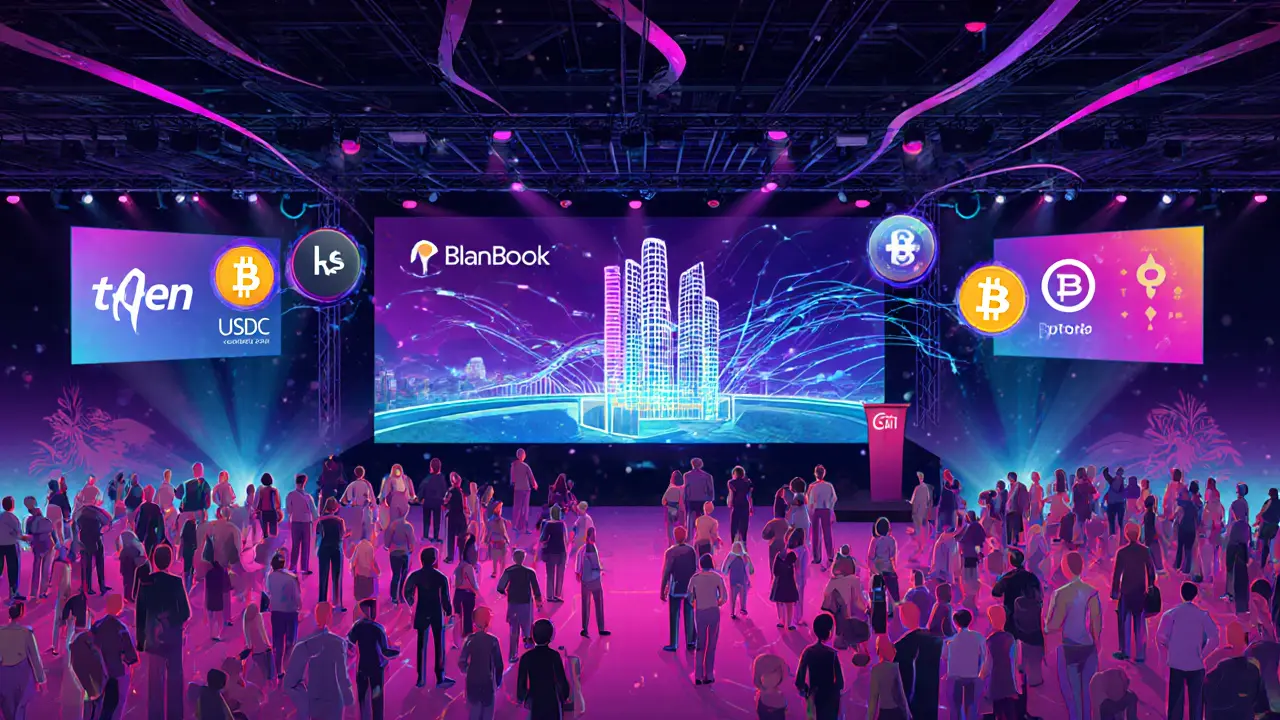Crypto Hub Comparison Tool
This tool compares the top crypto hubs globally based on key metrics from 2025 data.
Select a city to see detailed information about its crypto ecosystem.
Singapore
Rank: 42.4 trillion USD stablecoin volume
Regulatory clarity: 9.2/10
Hong Kong
Rank: 21.8 trillion USD stablecoin volume
Regulatory clarity: 8.0/10
Zurich
Rank: 30.9 trillion USD stablecoin volume
Regulatory clarity: 9.0/10
New York
Rank: 13.2 trillion USD stablecoin volume
Regulatory clarity: 7.5/10
Detailed Analysis
TL;DR
- Singapore ranks 4th globally in the Crypto‑Friendly Cities Index 2025 and scores 100 in the ApeX Protocol ‘crypto‑obsessed’ report.
- MAS provides a clear, tiered licensing regime that has attracted 83% of Fortune500 blockchain pilots.
- It is the world’s second‑largest stablecoin hub, handling $2.4trillion of on‑chain activity in APAC.
- Tax‑free treatment for trading, staking and mining makes it extremely attractive to individuals and firms.
- Token2049 2025 sold out with 25000 attendees, cementing Singapore’s status as the epicentre of crypto events in Asia.
Singapore is a sovereign city‑state that has positioned itself as a leading cryptocurrency and blockchain hub in Asia. In 2025 the island nation is no longer just crypto‑friendly - it’s crypto‑obsessed, scoring a perfect 100 in the ApeX Protocol report and landing fourth in the newly released Crypto‑Friendly Cities Index 2025. That dual recognition reflects a mix of forward‑thinking regulation, deep liquidity and a bustling tech ecosystem that pulls in both retail enthusiasts and global institutions.
Regulatory Backbone: MAS Leads the Way
Monetary Authority of Singapore (MAS) is Singapore’s central bank and financial regulator that has crafted one of the world’s most nuanced digital‑asset frameworks. MAS distinguishes between payment tokens, securities tokens and utility tokens, offering three clear licensing pathways: the Payment Services Act for crypto‑payment providers, the Capital Markets Services licence for security‑token offerings, and a custodial licence for asset‑safekeeping firms. This tiered approach gives firms certainty while keeping systemic risk in check.
Institutional trust is evident - 83% of Fortune500 blockchain pilots run under MAS‑approved licences. The regulator’s June302025 deadline that forced unlicensed players to shut down caused a short‑term liquidity crunch, but it also funneled capital into compliant firms, sharpening the market’s overall quality.
Stablecoin Supremacy
Stablecoin is a type of cryptocurrency pegged to a stable asset, typically a fiat currency, used for low‑volatility transactions activity in Singapore exploded after Circle reported $2.4trillion in on‑chain stablecoin volume across APAC between June2024 and June2025. The Singapore‑China corridor became the busiest cross‑border stablecoin route, moving more value than any other pair globally.
Corporate usage surged from under $100million in early2023 to over $3billion by early2025. Companies like Wetrip (a Singapore‑based travel agency), Capella Hotels (a luxury hotel chain) and Ginza Xiaoma (a high‑end reseller) now accept stablecoins for bookings, room charges and luxury goods, proving that fiat‑linked crypto is mainstream in the region.
Tax Incentives that Matter
The Singaporean tax code treats crypto trading, capital gains, staking rewards and mining income as tax‑free. This zero‑tax regime, paired with clear regulatory guidance, is a magnet for both individual traders and crypto‑focused enterprises. High‑profile founders - Gary Or (co‑founder of Crypto.com), Bobby Bao (co‑founder of Crypto.com) and Rafael Melo (co‑founder of Crypto.com) - have set up regional headquarters in the city‑state, reinforcing the tax advantage narrative.
Institutional Momentum: From BlackRock to Circle
BlackRock is the world’s largest asset manager, which chose Singapore as its Asian tokenisation hub. The firm is piloting tokenised bonds and real‑estate assets, leveraging Singapore’s legal certainty around tokenised securities.
In May2025, Circle (the US‑based stablecoin issuer behind USDC) opened a Singapore office, citing MAS chief FinTech officer Sopnendu Mohanty (a key advocate for crypto innovation in Singapore)’s remarks on the growing need for new forms of money.
Even the global payments network SWIFT (society for worldwide interbank financial telecommunication) is testing CBDC bridges with Singaporean banks, signalling that the city‑state could become a testbed for sovereign digital currencies.

Token2049 2025: The World’s Largest Crypto Gathering
Token2049 (the premier crypto conference held annually in Singapore) kicked off on October1,2025. The event sold out, drawing 25000 attendees from 160countries, 500+ exhibitors and 300+ speakers across all five floors of Marina Bay Sands. Title sponsors included OKX, Coinbase, TRON and DWF Labs, underscoring Singapore’s pull as the hub of global crypto discourse.
Comparing the World’s Top Crypto Hubs (2025)
| City‑State | Crypto‑Friendly Cities Rank* | APAC Stablecoin Volume (USDtrillions) | Regulatory Clarity Score (0‑10) |
|---|---|---|---|
| Singapore | 4 | 2.4 | 9.2 |
| HongKong | 2 | 1.8 | 8.0 |
| Zurich | 3 | 0.9 | 9.0 |
| UnitedStates (NewYork) | 1 | 3.2 | 7.5 |
While the UnitedStates still leads on raw volume, Singapore outperforms most rivals on regulatory clarity and tax efficiency, making it the most attractive hub for compliance‑heavy institutions.
Adoption Numbers Paint a Clear Picture
The Henley Crypto Adoption Index (a metric that scores countries on crypto usage, infrastructure and policy) gave Singapore a score of 45.7 out of 60, the highest worldwide. Millennials and GenZ in Singapore own crypto at rates three times higher than Baby Boomers, fueling demand for DeFi platforms, tokenised real‑estate and digital identity solutions.
Projecting forward, tokenised real‑world assets could unlock a $2trillion market by 2030, with Singapore positioned as the testbed. Firms like Sky Ventures (a venture capital firm backing crypto infrastructure)’s managing partner SkyWee says the city‑state “has achieved what no other crypto hub has: institutional trust at scale.”
Challenges and Risks to Watch
- Liquidity reallocation: The 2025 crackdown on unlicensed firms caused a temporary dip in trading volumes, but also cleared the field for compliant operators.
- Geopolitical exposure: Tensions in the Asia‑Pacific could affect cross‑border stablecoin routes, especially the Singapore‑China corridor.
- Regulatory fine‑tuning: MAS continues to refine its AML/CFT rules; firms must stay agile to avoid sanctions.
Practical Takeaways for Different Personas
For crypto startups: Register under the Payment Services Act if you issue payment tokens, or apply for a capital‑markets licence for security tokens. Leverage Singapore’s tax‑free stance to maximize runway.
For institutional investors: Use BlackRock’s tokenisation platform as a template for compliant exposure to tokenised assets. Partner with MAS‑approved custodians to meet AML requirements.
For retail enthusiasts: Trade on MAS‑licensed exchanges to enjoy zero capital‑gains tax. Consider staking on local DeFi protocols that have secured a regulatory sandbox licence.
Future Outlook: The Next Five Years
By 2030, Singapore aims to host $2trillion worth of tokenised real‑world assets, double the current on‑chain stablecoin volume, and double the number of MAS‑licensed crypto firms. Continued investment in blockchain R&D, a growing talent pool from local universities, and the city‑state’s strategic location will keep it ahead of rivals.
In short, Singapore isn’t just an Asian crypto hub - it’s the Singapore crypto hub that blends regulation, tax incentives and market depth into a formula that other jurisdictions struggle to match.

Frequently Asked Questions
Why is Singapore considered more crypto‑friendly than HongKong?
Singapore offers a clearer, tiered licensing regime, zero capital‑gains tax and a higher regulatory clarity score (9.2 vs 8.0 for HongKong). These factors reduce compliance costs and legal uncertainty for firms.
How does the MAS licensing process work for a new crypto exchange?
An applicant files under the Payment Services Act, provides AML/CFT policies, demonstrates adequate capital, and undergoes a risk‑based assessment by MAS. The full review typically takes 3‑6months.
What tax obligations do crypto traders have in Singapore?
There are no taxes on crypto capital gains, staking rewards, or mining income for individuals. Companies may have corporate tax on profits unrelated to crypto‑trading activities.
Which stablecoins are most used in Singapore?
USDC and USDT dominate, accounting for over 80% of on‑chain stablecoin volume in the APAC region, with growing interest in regional fiat‑backed tokens like SG‑Dollar.
Is Token2049 open to the public?
Yes, tickets are sold to retail attendees, though the event sells out quickly because of high demand from industry professionals and investors.


14 Responses
While I appreciate the comprehensive overview, the focus on regulatory clarity could be balanced with more discussion of grassroots adoption.
From a macro-financial perspective, the tokenised asset pipeline in Singapore exemplifies a hybridized model of distributed ledger interoperability and regulatory sandboxes.
The convergence of AML/KYC frameworks with DeFi primitives creates a fertile environment for cross-chain liquidity provisioning.
Moreover, the MAS's tiered licensing regimen aligns with the broader concept of 'RegTech-as-a-Service', facilitating compliance automation.
In essence, the ecosystem benefits from a synergistic overlay of institutional capital and vibrant developer communities.
Frankly, the article overstates Singapore's so-called 'crypto‑obsessed' status; it’s nothing but a hype‑driven narrative, rife with buzz‑words, and frankly, a misguided glorification of tax‑free arbitrage, which-if you ask me-undermines the very notion of fiscal responsibility.
Oh great, another city bragging about zero‑tax crypto trading-because what the world really needs is more jurisdictions turning a blind eye to financial opaqueness. Singapore may be the "hub," but let’s not pretend it’s a utopia for honest investors. The drama of regulatory clarity is just a backdrop for the next wave of speculative frenzy.
Absolutely love the energy here!!! Singapore’s ecosystem is truly thriving 🌟🚀-the MAS framework, the token events, the community vibe-everything just clicks!!! Keep pushing forward, the future is bright!!! 😊
We should look at how the Singapore model can be adapted elsewhere its licensing approach is a solid template for emerging markets.
Singapore’s emergence as a crypto hub is the result of deliberate policy choices combined with a vibrant private sector. The Monetary Authority of Singapore (MAS) introduced a tiered licensing regime that clearly delineates responsibilities for payment, securities, and utility tokens. This regulatory clarity reduces uncertainty for firms seeking to launch blockchain projects. At the same time, the zero‑tax stance on capital gains, staking rewards, and mining income creates a compelling financial incentive for both individuals and corporations. Institutional players such as BlackRock and Circle have publicly cited Singapore’s legal certainty as a key factor in their regional expansion. The stablecoin volume of $2.4 trillion in APAC underscores the depth of liquidity available on the island. Token2049’s sold‑out attendance further validates the city‑state’s status as a global gathering point for crypto thought leaders. Moreover, the integration of AML/CFT requirements within the licensing process ensures that compliance is baked into the ecosystem. From an investor’s perspective, the combination of high regulatory scores and tax efficiency translates into lower operational costs. For developers, the presence of sandbox environments encourages rapid prototyping while maintaining oversight. Academia and research institutions in Singapore contribute to a pipeline of talent that fuels innovation. The government’s strategic investment in blockchain R&D aligns with broader economic diversification goals. Looking ahead, the target of $2 trillion in tokenised real‑world assets by 2030 is ambitious but plausible given current momentum. Stakeholders should monitor the evolving AML guidelines to stay ahead of any regulatory adjustments. In summary, Singapore offers a unique blend of clarity, capital efficiency, and community engagement that is difficult to replicate elsewhere.
Sounds impressive! :)
Everyone seems to think Singapore is the pinnacle of crypto progress, yet history shows that such rapid centralization often leads to unforeseen pitfalls-market manipulation, regulatory capture, and a hollowed‑out grassroots ecosystem. The narrative ignores the undercurrents of offshore arbitrage and the potential for sudden policy reversal.
This is really inspiring! I hope more places follow Singapore’s example.
While Singapore’s framework is impressive, it’s essential to recognize the cultural nuances that make adoption successful in Asia. Local trust in institutions, combined with a tech‑savvy population, amplifies the impact of regulatory clarity. Other regions should tailor their approaches rather than copy‑paste Singapore’s model.
Thiss is great newsf for the crypto communitty, and i cant wait to see wht happens next!
In the grand tapestry of global finance, Singapore's ascent as a crypto citadel represents a decisive stroke of legislative artistry; a consummate performance that befits the annals of economic history.
What they don't tell you is that the MAS's "transparent" policies are part of a larger agenda to funnel digital assets into covert channels controlled by unseen actors. The data shows anomalous inflows that align with offshore jurisdictions known for secrecy, suggesting a hidden layer of influence that the public narrative conveniently omits.